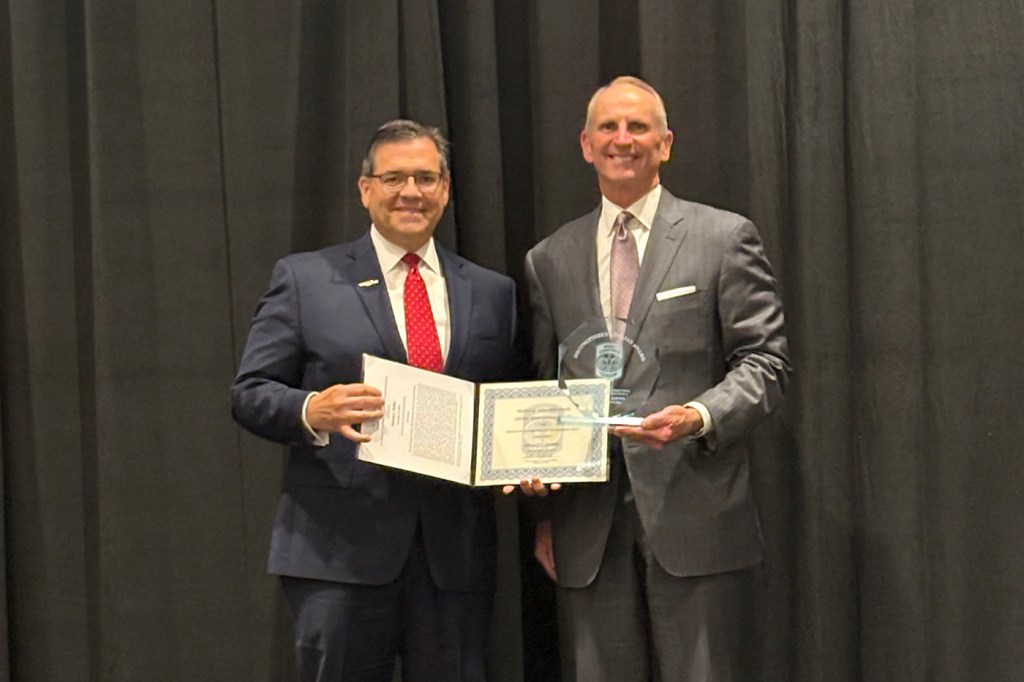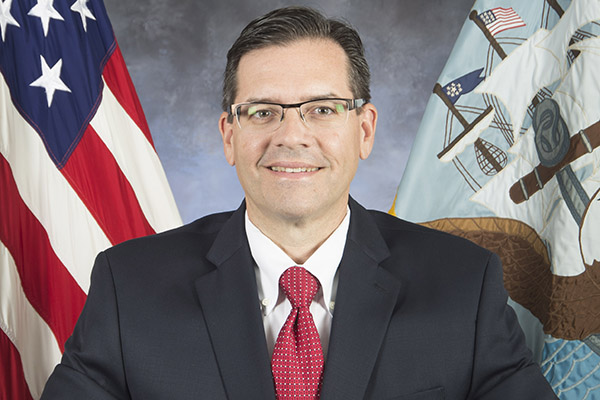Northeastern graduate honored for pioneering submarine technology and strategy for the US Navy

From small lightweight, unmanned vehicles to the 18,000 ton Ohio Class SSBN, submarines have been the life’s work of Northeastern graduate Donald L. Hoffer.
On Thursday, Nov. 14, the Naval Submarine League honored Hoffer’s 37-year career with the Department of the Navy with the Distinguished Civilian Award, given annually to a civilian whose work has been of significant importance to the U.S. Submarine Force.
“The submarine force is the warfare arm that operates all of our submarines for the United States: attack submarines, ballistic submarines, search and rescue submersibles,” he says.
The undersea vessels, especially those crewed by humans, are “one of the more complex systems in the world,” says Hoffer, who graduated from Northeastern with a degree in mechanical engineering.
“You have life support systems, propulsion systems and a nuclear reactor for energy. Designs must deal with the pressures of the ocean,” he says. “It’s amazing technology. As an engineer, that has always been very interesting.”
Hoffer, who retired from the Department of the Navy in 2021, spent his last seven years of service with the Navy’s Fleet Forces Command in Norfolk, Virginia.
As executive director, Hoffer played a leadership role in building facilities, training crews, getting submarines ready for deployment and advising the military commander of the fleet on the future of undersea warfare.
Collaboration and strategy
The Naval Submarine League said Hoffer’s emphasis on collaboration and strategy has led to a resurgence in undersea warfare capabilities at a time when other nations are vying to control the watery depths.
At the time of his graduation from Northeastern, submarines were not exactly on Hoffer’s radar.
Commuting from his parents’ home in Waltham for all but one semester, Hoffer had co-ops with the U.S. Army and defense contractor Raytheon.
“That was really beneficial from an engineering standpoint,” Hoffer says about the experiential education. “I’m that kind of learner. It was a great advantage for me.”

The son of the Coast Guard commander in Boston, Hoffer was recruited by the U.S. Department of the Navy to work as a civilian employee after graduating from Northeastern.
Among the opportunities available was an engineer-in-training program that had him working at the Portsmouth Naval Shipyard on a submarine under repair and then going to Navy headquarters at the Pentagon in Washington, D.C.
“I ended up getting hired into what is called the deep submergence program,” Hoffer says.
Working on the Alvin
“I spent a lot of my career working in deep ocean submersibles, including submarine rescue. One of the jobs I did, back in 2012, was help the National Science Foundation get the manned submersible Alvin back into service.”
Alvin is best known as the first submersible to take people—Woods Hole Oceanographic Institution scientist Robert Ballard and two companions—to the wreckage of the Titanic in 1986.
“As a Northeastern mechanical engineering student, I visited Woods Hole with the American Society of Mechanical Engineers while the search for Titanic was underway. I was fascinated by the submersible’s design and surprised by the announcement of the Titanic discovery shortly thereafter,” Hoffer says.
“Years later I would work with some of the same engineers as they upgraded Alvin.”
The NSF funds maintenance and operations at Woods Hole on the Alvin, which can dive to ocean depths of four miles. The Navy supports engineering work and provides safety certification.
Featured Posts
Seawolf class of submarines
He experienced a change of pace when he worked as deputy program manager for the Seawolf class of submarines that can hold a crew of more than 100 people.
“The Seawolf is extremely complex. It’s fast; it’s quiet,” Hoffer says. “And it carries many more weapons than most submarines.”
As a civilian employee, Hoffer did not wear a uniform or deploy on the submarines he worked on.
“You go to sea from time to time. I would go out for a week, which was enough for me,” he says. “The first submarine I was on is actually in a museum in San Diego right now. The former USS Dolphin is only 165 feet long and could dive to 3,000 feet.”
“You say to yourself, ‘Wow, that’s small,’” Hoffer says. “But the inside of the submarine is also filled with machinery piping and electronic systems,” which makes it seem even smaller.
Since retiring from the Navy three years ago, Hoffer has worked for defense contractor L3 Harris Technologies’ Fall River location, running their unmanned undersea vehicle unit.
The unmanned vehicles are used for a variety of purposes, including seafloor mapping, mine countermeasures and environmental monitoring.
“Right now I’m a strategist for their maritime sector. My job is looking to the future and understanding what our Navy and (allied) navies needs are,” Hoffer says.
Nuclear deterrent
Submarines are an important ship for many of the world’s navies, Hoffer says.
“Many countries have submarine forces of different sizes,” he says. “You could name almost any country with a coastline that has a significant economy,” and they will have a submarine force, including countries in Europe, South America, Asia and South Africa.
“The U.S. Submarine Force carries over 50% of our nuclear deterrent,” he says. “Then we have attack submarines, which are really capable platforms and give the United States a lot of leverage in deterring naval conflicts.”
The sub’s stealth factor keeps potential adversaries wondering, Hoffer says. “You can never really know whether a submarine is in the area or not.”
“Submarines have been important since World War I,” when Germany threatened the U.S. coastline, Hoffer says. He said the undersea vessels helped turn the tide of war against Japan in World War II and served throughout the Cold War.
He advises Northeastern students to consider a civilian career in the Navy, saying it is looking for people in all kinds of fields, including mechanical, civil and biomedical engineering.
The Northeastern connection
“I’ve met a lot of Northeastern graduates (on the job) and they do really well in the Navy. I’ve had bosses who were Northeastern graduates. I know several Northeastern engineers that have really excelled and been leaders in the Navy.”
Hoffer received the Distinguished Civilian Award during the Naval Submarine League’s annual symposium and industry update in Arlington, Virginia, during a ceremony attended by Secretary of the Navy Carlos Del Toro.
In addition to Hoffer, the ceremony recognized four eminent submarine officers, including former President Jimmy Carter represented by his family.
“Working for the Navy has been extremely challenging and extremely rewarding,” Hoffer says. “As you tackle interesting and challenging engineering projects, you know you’re playing a critical role in the nation’s defense,” he said.












